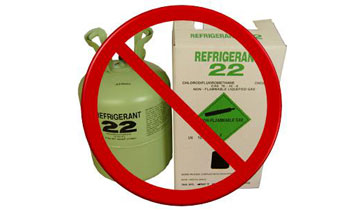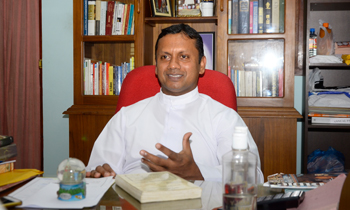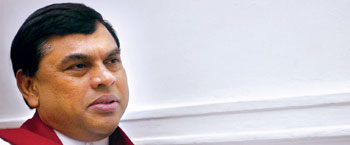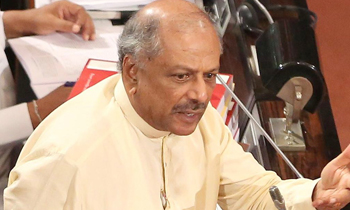
Subscribe
Login
 Mahaweli Development and Environment Ministry will ban importing of household electric appliances that contain Hydrochloro-flurocarbon (HCFC) effective from January 1st, 2018 as the use of HCFC is extremely harmful to the environment and to the ozone layer, a senior official of the Ministry said yesterday.
Mahaweli Development and Environment Ministry will ban importing of household electric appliances that contain Hydrochloro-flurocarbon (HCFC) effective from January 1st, 2018 as the use of HCFC is extremely harmful to the environment and to the ozone layer, a senior official of the Ministry said yesterday.
The electric equipments thus banned from next year are: Freezer or Refrigerated trucks or Refrigerated containers, Refrigerators, Freezers, Water coolers, Ice machines, Air conditioning and heat pumping units.
Introducing of additional regulations for further strengthening of phasing out of Hydrochloro-flurocarbon (HCFC).
The Ministry of Mahaweli Development and Environment, which is the focal point for Vienna Convention and Montreal Protocol on protection of ozone layer has been entrusted with responsibility in resolving of environment related problems for granting comfortable and healthy environment for the nation. As a party to the Montreal Protocol since 1989, Sri Lanka worked on gradual phase out of ozone depleting substances (ODSs) within the stipulated time frame and has taken initiative in introducing of ozone friendly alternative substances and technologies, Secretary of the Mahaweli Development and Environment, Anura Dissanayaka said.
Some 96 chemicals have been identified as ODSs and out of which import of 56 high aggressive chemicals such as Chloroflurocarbons (CFC), Bromofluoromethane (Halon) Carbontetrachloride (CTC) etc. were banned since 2010. At present, remaining 40 chemicals that are less aggressive on ozone depletion, named Hydrochloroflurofcarbons (HCFC) are being phased out. Several gazette notifications had been published time to time since 1996 for regulating the use of Ozone Depleting Substances, complying with the Montreal Protocol regulations, Mr. Dissanayaka told Daily Mirror.
The relevant gazette notification banning the electric items carrying HCFC chemicals will be issued in the next fortnight, he added.
“The last Extraordinary Gazette Notification was issued under the Import and Export (control) Act of 1969 on 01.08.2013 to introduce measures in order to control of HCFC import. Under the new regulations, import quota system was introduced with effect from 01.01.2013,” Mr. Dissanayaka pointed out.
With the ongoing phase-out of HCFC programme (Gradual reduction of import of HCFCs), import of HCFC will be cut down by 35% of the quantity imported in 2013. Hence, there will be a shortage of HCFCs in the market for service and maintain of existing equipment, if the import of HCFC based equipment are allowed to continue.
In addition, Sri Lanka has agreed to the resolution adopted at the United Nations Climate Change Conference held in Paris, in December 2015 and subsequently signed in New York on 22nd April 2016 to contribute for the global effort to achieve the long-term goal of keeping the increase in global average temperature to well below 2°C above pre-industrial levels. Global Warming Potential of Hydrochloroflurocarbons are greater than carbon dioxide by 1,800 times have direct impact on global warming. Therefore, controlling of ozone depleting substances in order to protect the ozone layer is directly involved to control the global warming, he stressed. (Sandun A Jayasekera)
 Mahaweli Development and Environment Ministry will ban importing of household electric appliances that contain Hydrochloro-flurocarbon (HCFC) effective from January 1st, 2018 as the use of HCFC is extremely harmful to the environment and to the ozone layer, a senior official of the Ministry said yesterday.
Mahaweli Development and Environment Ministry will ban importing of household electric appliances that contain Hydrochloro-flurocarbon (HCFC) effective from January 1st, 2018 as the use of HCFC is extremely harmful to the environment and to the ozone layer, a senior official of the Ministry said yesterday.
The electric equipments thus banned from next year are: Freezer or Refrigerated trucks or Refrigerated containers, Refrigerators, Freezers, Water coolers, Ice machines, Air conditioning and heat pumping units.
Introducing of additional regulations for further strengthening of phasing out of Hydrochloro-flurocarbon (HCFC).
The Ministry of Mahaweli Development and Environment, which is the focal point for Vienna Convention and Montreal Protocol on protection of ozone layer has been entrusted with responsibility in resolving of environment related problems for granting comfortable and healthy environment for the nation. As a party to the Montreal Protocol since 1989, Sri Lanka worked on gradual phase out of ozone depleting substances (ODSs) within the stipulated time frame and has taken initiative in introducing of ozone friendly alternative substances and technologies, Secretary of the Mahaweli Development and Environment, Anura Dissanayaka said.
Some 96 chemicals have been identified as ODSs and out of which import of 56 high aggressive chemicals such as Chloroflurocarbons (CFC), Bromofluoromethane (Halon) Carbontetrachloride (CTC) etc. were banned since 2010. At present, remaining 40 chemicals that are less aggressive on ozone depletion, named Hydrochloroflurofcarbons (HCFC) are being phased out. Several gazette notifications had been published time to time since 1996 for regulating the use of Ozone Depleting Substances, complying with the Montreal Protocol regulations, Mr. Dissanayaka told Daily Mirror.
The relevant gazette notification banning the electric items carrying HCFC chemicals will be issued in the next fortnight, he added.
“The last Extraordinary Gazette Notification was issued under the Import and Export (control) Act of 1969 on 01.08.2013 to introduce measures in order to control of HCFC import. Under the new regulations, import quota system was introduced with effect from 01.01.2013,” Mr. Dissanayaka pointed out.
With the ongoing phase-out of HCFC programme (Gradual reduction of import of HCFCs), import of HCFC will be cut down by 35% of the quantity imported in 2013. Hence, there will be a shortage of HCFCs in the market for service and maintain of existing equipment, if the import of HCFC based equipment are allowed to continue.
In addition, Sri Lanka has agreed to the resolution adopted at the United Nations Climate Change Conference held in Paris, in December 2015 and subsequently signed in New York on 22nd April 2016 to contribute for the global effort to achieve the long-term goal of keeping the increase in global average temperature to well below 2°C above pre-industrial levels. Global Warming Potential of Hydrochloroflurocarbons are greater than carbon dioxide by 1,800 times have direct impact on global warming. Therefore, controlling of ozone depleting substances in order to protect the ozone layer is directly involved to control the global warming, he stressed. (Sandun A Jayasekera)








